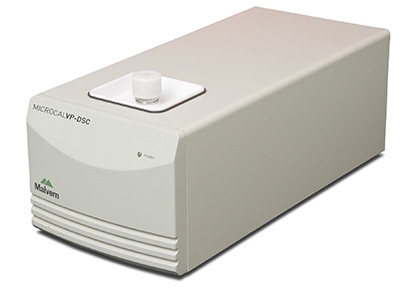MicroCal VP-DSC is a sensitive, easy-to-use differential scanning calorimeter for studying samples in solution. It can be used to measure the intramolecular stability of a broad spectrum of biomolecules, including proteins, nucleic acids, lipids, and detergent micellar systems. MicroCal VP-DSC provides fast, accurate transition midpoint (Tm) determination. In addition, a thermodynamic profile can be generated, providing insight into the factors that affect conformation and stability.
MicroCal VP-DSC is a sensitive, easy-to-use differential scanning calorimeter for studying samples in solution. It can be used to measure the intramolecular stability of a broad spectrum of biomolecules, including proteins, nucleic acids, lipids, and detergent micellar systems. MicroCal VP-DSC provides fast, accurate transition midpoint (Tm) determination. In addition, a thermodynamic profile can be generated, providing insight into the factors that affect conformation and stability.
Typical applications include determination of protein stability and folding, antibody domain structure determination, characterization of membranes and lipids, and the measurement of ultra-tight molecular interactions.

|
The ability to study molecules in their native state without labeling. Can be used with solutions or turbid suspensions
The ability to measure very tight binding constants (up to 1020 M-1)
Unattended operation after sample loading, which allows you to focus on other tasks
A complete system without the need for additional accessories, reagents or consumables
Differential scanning calorimetry (DSC) is a powerful analytical tool for characterizing the stability of proteins and other biomolecules. DSC directly measures the enthalpy (ΔH) and temperature (Tm) of thermally induced structural transitions in solution.
DSC data supplies the thermodynamic parameters of protein unfolding, including the midpoint unfolding temperature, enthalpy, entropy, Gibbs free energy, and heat capacity changes upon unfolding.
DSC is also used to determine the change in heat capacity (ΔCp) of denaturation. DSC can elucidate the factors that contribute to the folding and stability of native biomolecules, including hydrophobic interactions, hydrogen bonding, conformational entropy, and the physical environment.
Nonreactive Tantalum cells for excellent chemical resistance
Fixed-in-place cells for reproducible ultrasensitive performance with low maintenance
Three user selectable response times for maximum performance
User selectable temperature scan rates and range for application versatility
Self-contained pressurization system (0-45 psi) for studying solutions above their boiling point
Pressure Perturbation Calorimetry accessory available for determination of partial specific volumes
Peltier element for precise temperature control
Includes MicroCal ThermoVac sample preparation and cleaning device
Controlled by VPViewer software and data analysis performed with Origin
| MicroCal VP-DSC | |
|---|---|
| Operating temperature range | -10 to 130°C |
| Response time | 7 s |
| Cell design | Coin-shaped |
| Cell volume | 500 μl |
| Cell material | Tantalum |
| Sample throughput | 2-5 per 8 hour day |
| Weight | 8.2 kg |
| Footprint (W × H × D) | 20 × 44 × 19 cm |